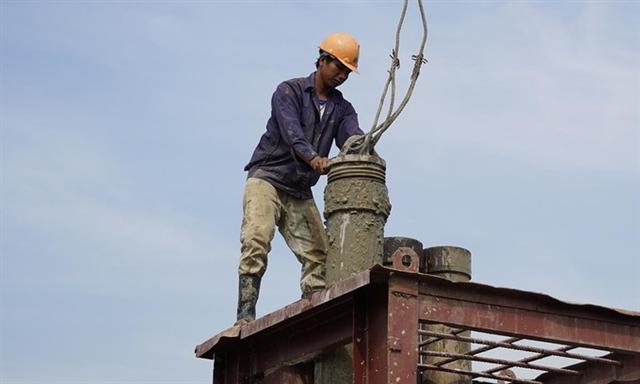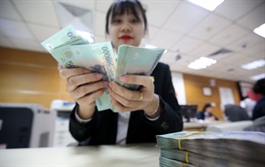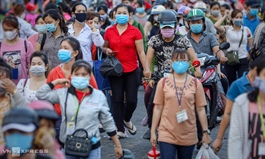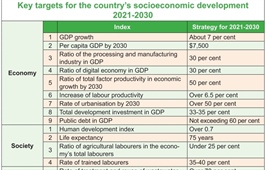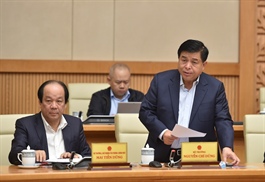More reforms, less interference: experts expect private sector tilt
More reforms, less interference: experts expect private sector tilt
Experts say they expect more pronounced support for the private sector from Vietnam's new leadership in the coming years.
A worker is seen working on a road construction in the southern province of Long An in January, 2021. Photo by VnExpress/Hoang Nam.
|
Although the country has witnessed impressive economic transformation in the last three decades, there was still work that government leaders need to do to promote its ongoing push for reforms, said Yun Liu, an economist with HSBC Global Research.
Improving the business environment should be a priority, she told VnExpress International, adding: "To encourage private investor participation, more reforms are needed to address lingering issues and create a better investment climate."
Business leaders have repeatedly said that going through the complicated paperwork process remains one of the biggest challenges they face in Vietnam.
Do Trong Khoa, chairman of construction firm Hong Linh Investment and Tourism in the central province of Ha Tinh, told local media that there are times when the implementation of a decision by provincial authorities takes several months, unduly delaying the company’s projects.
Other companies said they expect more fairness from the new administration. Le Duy Binh, CEO of Hanoi-based consultancy firm Economica Vietnam, said the government should refrain from interfering with businesses’ decisions to ensure a free market.
It should issue policies that benefit all three sectors of the economy, state-owned enterprises, private companies and foreign direct investment companies, he added.
Andrew Jeffries, ADB country director for Vietnam, said a level playing field for private and state-owned enterprises means both would have equal access to land and credit.
"The development of efficient land and capital markets would facilitate and make more transparent this access to land and capital."
He added that another priority should be providing private companies with adequate information on government procurement processes and needs and external markets, which would improve linkages between suppliers and buyers and generate more business opportunities.
Nicolas Audier, Chairman of the European Chamber of Commerce in Vietnam, said as private enterprise will continue to be at the heart of Vietnam’s success in the future, the government should continue to streamline administrative procedures, modernize the legal framework, and open more sectors to foreign investment and innovation.
Increasing the country’s labor force quality is another key task, experts said. Liu of HSBC said while labor availability to move from agriculture to manufacturing is an opportunity, the lack of productivity presents a challenge.
Vietnam should focus on improving the quality of its education and vocational training to take full advantage of its demographic dividends, she added.
One way to increase productivity is by digitalizing the economy, Audier said. "The government’s ambition to digitalize different sectors and industries will accelerate the shift from labor-intensive, natural resource-dependent jobs to higher value-added work."
Jeffries of ADB said human resource development for digital transformation should be done at all levels of education, including technical and vocational education.
"Firms’ participation in education, including the design of curriculum, will be useful in improving the skills and employability of graduates."
Several experts remarked on the need to improve infrastructure quality.
Although official figures show that about 85 percent of the government’s investment has gone to infrastructure development in recent years, experts said there were many shortcomings still, especially the lack of a uniform infrastructure network between regions, which hinders connectivity.
"In addition to upgrading, Vietnam requires large investments in new infrastructure. Given its ambitious projects and growing budget constraints, we think the public-private partnership (PPP) model has emerged as a sustainable solution," Liu said.
Other experts called for greater attention to resolving environmental issues that could hamper growth.
Jacques Morisset, World Bank lead economist and program leader for Vietnam, said the increasing pollution in Hanoi and rising water levels in the Mekong Delta are some of the examples of the environmental impacts on Vietnam’s economy.
Besides developing new technologies and improving skills, the government should also adopt environment-friendly policies that ensure sustainable growth, he added.
The 13th Communist Party Central Committee on Sunday elected Party General Secretary and State President Nguyen Phu Trong for another five-year term as Party chief, his third consecutive tenure.
Trong said last week that Vietnam should strive to become a developed country by mid-21st century.
Some of the Party’s economic goals for the upcoming years include having about 1.5 million private companies making up 55 percent of GDP by 2025, versus 700,000 representing 42 percent now.
Average economic growth of 6.5-7 percent during 2021-2025, compared to 5.9 percent in the last five years.
It also aims to increase per capita GDP to $4,700-5,000 by 2025 from $2,750 at the end of last year.


